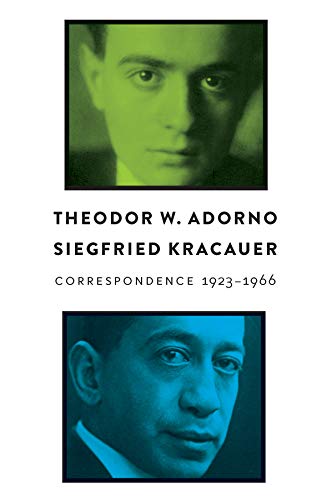

Correspondence: 1923 - 1966
Theodor W. Adorno, Michael Winkler, Siegfried Kracauer, Susan Reynolds
3.25(4 readers)
Theodor W. Adorno and Siegfried Kracauer were two of the most influential philosophers and cultural critics of the 20th century. While Adorno became the leading intellectual figure of the Frankfurt School, Kracauer’s writings on film, photography, literature and the lifestyle of the middle classes opened up a new and distinctive approach to the study of culture and everyday life in modern societies.This volume brings together for the first time the long-running correspondence between these two major figures of German intellectual culture. As left-wing German Jews who were forced into exile with the rise of Nazism, Adorno and Kracauer shared much in common, but their worldviews were in many ways markedly different. These differences become clear in a correspondence that ranges over a great diversity of topics, from the nature of criticism and the meaning of utopia to the work of their contemporaries, including Bloch, Brecht and Benjamin. Where Kracauer embraced the study of new mass media, above all film, Adorno was much more sceptical. This is borne out in his sharp criticism of Kracauer’s study of the composer Offenbach, which Adorno derided as musically illiterate, as well as his later criticism of Kracauer’s Theory of Film. Exposing the very different ways that both men were grappling intellectually with the massive transformations of the 20th century, these letters shed fresh light on the principles shaping their work at the same time as they reveal something of the intellectual brilliance and human frailties of these two towering figures of 20th century thought. This unique volume will be of great value to anyone interested in critical theory and in 20th century intellectual and cultural history.
Publisher
Polity
Publication Date
10/6/2020
ISBN
9780745694757
Pages
450
Categories
About the Author

Theodor W. Adorno
Theodor Wiesengrund Adorno was one of the most important philosophers and social critics in Germany after World War II. Although less well known among anglophone philosophers than his contemporary Hans-Georg Gadamer, Adorno had even greater influence on scholars and intellectuals in postwar Germany. In the 1960s he was the most prominent challenger to both Sir Karl Popper's philosophy of science and Martin Heidegger's philosophy of existence. Jürgen Habermas, Germany's foremost social philosopher after 1970, was Adorno's student and assistant. The scope of Adorno's influence stems from the interdisciplinary character of his research and of the Frankfurt School to which he belonged. It also stems from the thoroughness with which he examined Western philosophical traditions, especially from Kant onward, and the radicalness to his critique of contemporary Western society. He was a seminal social philosopher and a leading member of the first generation of Critical Theory.
Unreliable translations hampered the initial reception of Adorno's published work in English speaking countries. Since the 1990s, however, better translations have appeared, along with newly translated lectures and other posthumous works that are still being published. These materials not only facilitate an emerging assessment of his work in epistemology and ethics but also strengthen an already advanced reception of his work in aesthetics and cultural theory.
Unreliable translations hampered the initial reception of Adorno's published work in English speaking countries. Since the 1990s, however, better translations have appeared, along with newly translated lectures and other posthumous works that are still being published. These materials not only facilitate an emerging assessment of his work in epistemology and ethics but also strengthen an already advanced reception of his work in aesthetics and cultural theory.
Questions & Answers
Reader Reviews
Loading comments...